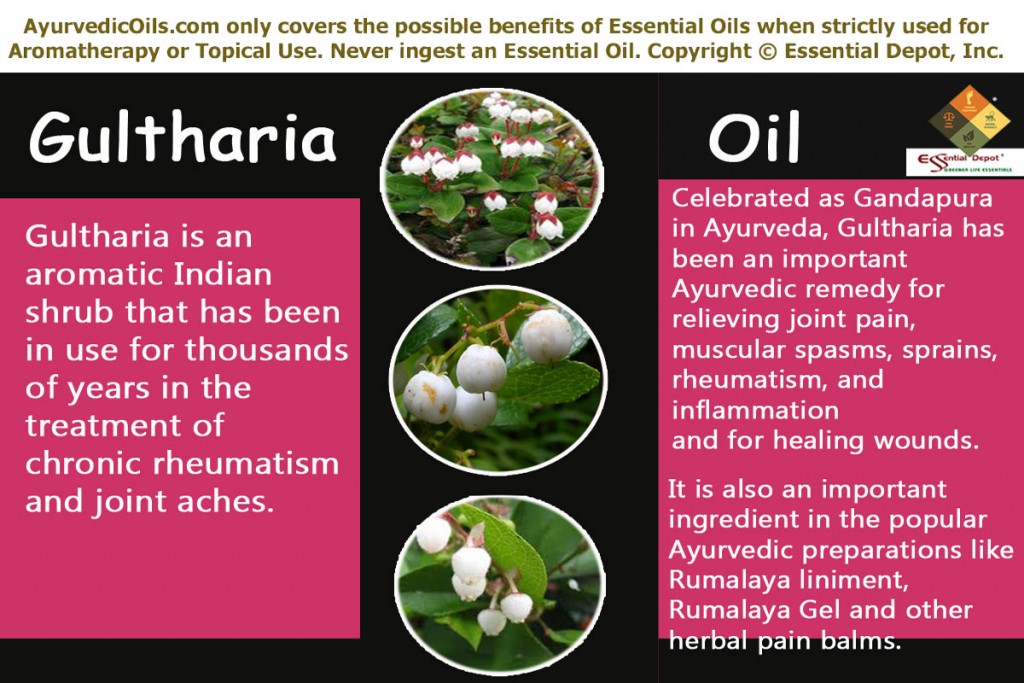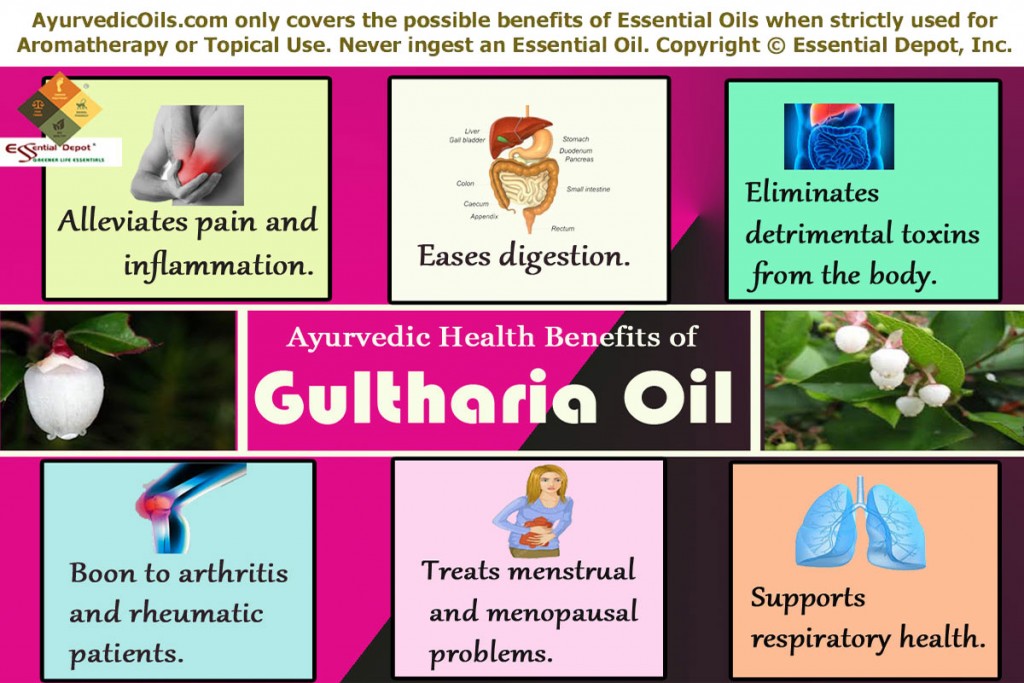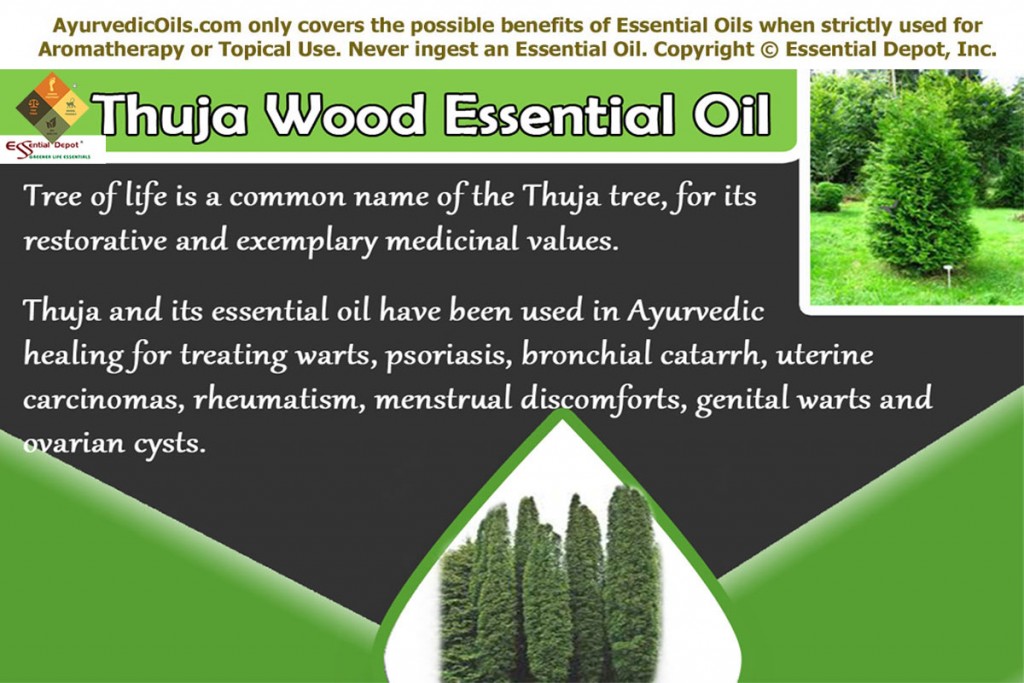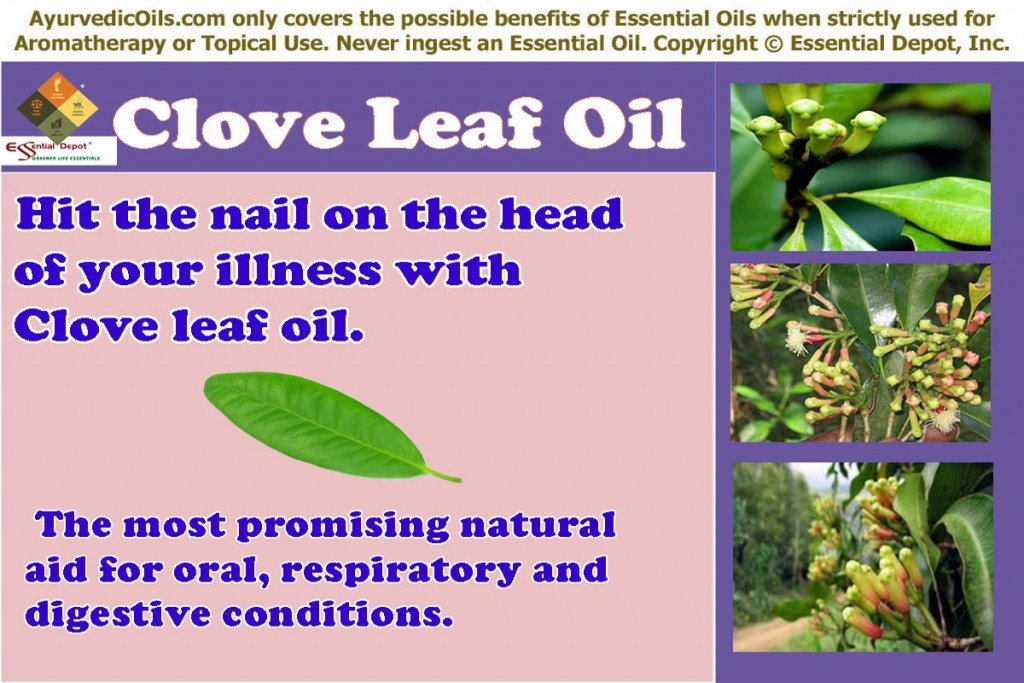 Are you on a voyage to turn over a new leaf in your drowning health regimen? Then step into the room of fitness by switching to Clove leaf and its rejuvenative essential oil. Used as a culinary and healing herb across the world, Clove leaves and its unopened flower buds steal the show in treating enormous health conditions.
Are you on a voyage to turn over a new leaf in your drowning health regimen? Then step into the room of fitness by switching to Clove leaf and its rejuvenative essential oil. Used as a culinary and healing herb across the world, Clove leaves and its unopened flower buds steal the show in treating enormous health conditions.
With the botanical name Syzigium aromaticum (Eugenia caryophyllata), Clove is known in the world of Ayurveda as “Devapushpa”, meaning sacred flower and as “Devakusum”, which means flower of Deities.
Commonly called as Laung in India, Clove leaf and its essential oil have been noted as Vaktra kleda daurgandhya nashana, means it is used medicinally for treating bad breath and problems in the oral cavity.
It is also used in various Ayurvedic treatments of halitosis, sciatica, lumbago, rheumatic problems, tonsillitis, indigestion, bronchitis, asthma, osteoporosis, breathing difficulty, sore throat, premature ejaculation, diabetes, impotence, toothache, gingivitis, periodontitis and few other oral conditions.
Purchase Clove Leaf Essential Oil – Wholesale – CLICK HERE
Purchase Clove Leaf Essential Oil – Retail – CLICK HERE
Historical uses and importance of Clove leaf oil:
Clove is an evergreen tree, which is found growing in plenty in Sri Lanka, Madagascar, Zanzibar, Singapore, Mauritius, Pakistan, Tanzania, and India (Kerala and Tamilnadu). It is indigenous to the celebrated Spice Islands, the Moluccas Islands in Indonesia.
The most popular herbalist, Hildegard of Bingen suggested Clove for treating swelling of the intestines, gout, hiccups and nasal congestion. The Western herbalism used Clove leaf and its flower buds in the treatment of erectile problems, tooth decay, poor circulation, vomiting, bad breath and sluggish digestion.
The use of Cloves in the TCM or the Traditional Chinese Medicine dates back to 207 B.C. Called as Ding xiang, this miraculous herb is being used for alleviating infections in the kidneys, digestive disorders, impotence, nausea, hernia and various skin problems like ringworm and certain other fungal infections. With its warm and acrid properties, Clove was indeed used as a trusted Chinese remedy for fortifying the functions of the spleen, kidneys and the stomach meridians.
The tea prepared with Clove leaf and buds have been used in the Tibetan and other traditional medicines for multiple sclerosis, inflammation and certain autoimmune disorders. The essential oil is also recommended for treating hypnotic muscles, arthritic pain and rheumatic conditions.
Clove is one among those prized natural remedies in Ayurveda and is used topically for treating toothache, oral cavities, chest congestion, improper blood circulation, slow metabolism, bloating, sore throat and cough.
Chewing the fresh leaves and buds of the Clove tree were used as natural breath freshener and is a folklore remedy for fighting against germs, bad breath, intestinal infections and gum problems.
An herbal infusion prepared with Clove leaves and buds powder along with powdered black pepper, dry ginger, and borax is a proven herbal remedy for relieving bronchitis and asthmatic attacks.
Therapeutic properties and chemical constituents of Clove leaf oil:
The essential oil of Clove leaf contains eugenol (about 82 to 88%) as the major ingredient, which contributes to its numerous healing values. Other major chemical components of Clove oil are vanillin, caryophyllene, acetyl eugenol, crategolic acid, beta-caryophyllene, methyl salicylate, bicornin, eugenitin, gallotannic acid, eugenin, stigmasterol, kaempferol, oleanolic acid, rhamnetin, monoterpenes, ketones, aldehydes and certain sesquiterpenes.
The primary therapeutic properties of Clove leaf oil are analgesic, carminative, antispasmodic, anthelmintic, anti-inflammatory, antiseptic, antioxidant, digestive, anesthetic, stimulant, appetizing, diaphoretic, aphrodisiac, antifungal, anti-carcinogenic and blood cleansing.
Ayurvedic health benefits of Clove leaf essential oil:
“Knowledge of life” is all the word ‘Ayurveda’ means. Being a holistic healing approach, the wings of Ayurveda covers everything for addressing a human to be healthy, including his physical, mental and spiritual well-being. The most renowned Ayurvedic philosopher Charaka quotes, “The three – body, psyche, and soul – act as a tripod. The world stands upon them, and within them, the world abides.”
Ayurveda regards human body as a temple and trusts that the pure soul dwells in. It aims at maintaining the purity of the soul by keeping the mind, body and spirit clean with clean habits, healthy food regimen, yoga, meditation and prayers for nurturing the mind and the spirit.
The root of Ayurveda is vested with India, the land of the richest and oldest historical values. It is said to be in existence for about 5000 years. This ancient healing methodology states that everything is a part of Mother Nature and is made of the five fundamental elements of nature, including fire, earth, water, air and space.
Ayurveda is a comprehensive healing science that regards every individual as a unique entity, as it strongly believes that no two persons are same in physical, emotional and spiritual aspects. With this firm foundation, Ayurveda prescribes unique remedies for each individual based on their unique individual constitution or doshas (combination of the elements of nature).
The three doshas are vata (air and space), pitta (fire and water) and kapha (earth and water). Every individual is created with a unique combination of these doshas. According to Ayurveda, absolute health means striking perfect balance with nature and sickness or ill-health is an indication that a person is out of balance with nature due to irregular eating routine, change in weather conditions and behavioral changes.
Ayurveda recommends natural medications including Ayurvedic essential oils, Ayurvedic routine, Pranayama or the balanced breathing technique, herbal remedies, Panchakarma or the art of Ayurvedic detoxification, yoga, meditation and prayers based upon an individual’s unique constitution and for treating doshic imbalances.
Clove leaf and its essential oil with the warm and soothing properties assist in augmenting pitta energy and pacifying kapha and vata doshas in excess.
The most predominant Ayurvedic health benefits of Clove leaf oil are: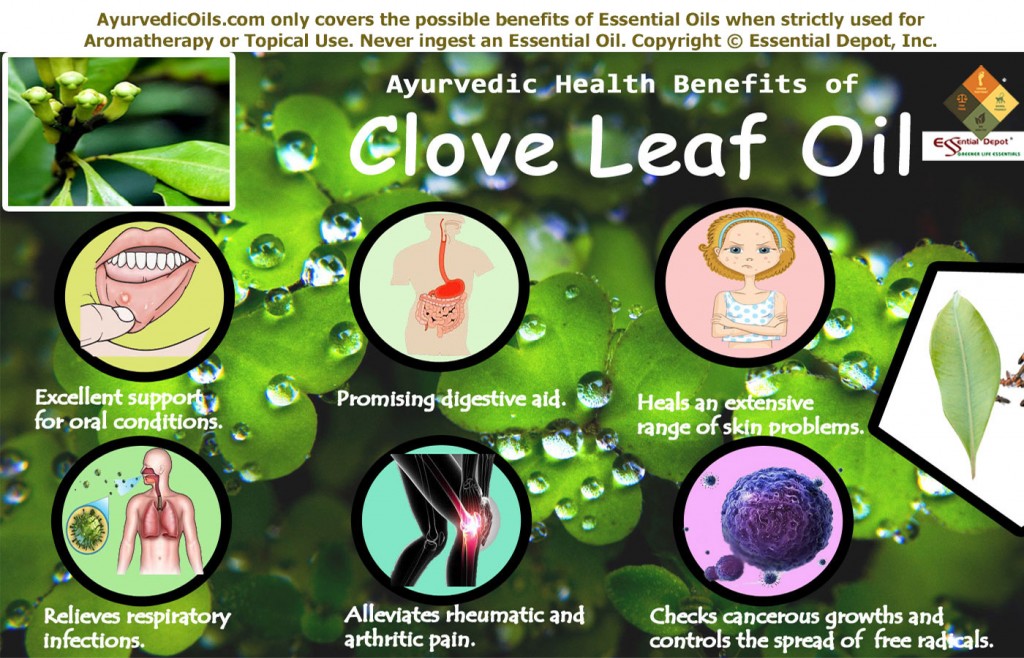 1. Excellent support for oral conditions:
1. Excellent support for oral conditions:
The antibacterial and anodyne properties of Clove and its essential oil make it an excellent cure for administering dental emergencies and oral problems. This formula is used in mouthwash liquids, toothpastes and dental creams for fighting against germs, bacteria and other micro-organisms that affect oral health.
A 2006 study conducted by the Kuwait University have witnessed that a medication prepared with Clove is as effective as a benzocaine gel when used as a topical anesthetic for intraoral injections.
The pain-relieving or analgesic properties and numbness or anesthetic properties of Clove leaf oil is attributed to the presence of eugenol component. Numerous research studies conclude that eugenol reveals pharmacological actions on all parts of the human system as it possess anti-inflammatory and free radical scavenging effects.
A recent research based in Argentina has proved that the essential oil of Clove is an effective antiseptic and antimicrobial agent for oral infections and fights effectively against Escherichia coli, pseudomonas aeruginosa, staphylococcus aureus and certain other gram-positive and gram-negative bacteria.
Gargling with a cup of warm water infused with 2 drops of Clove leaf oil can help in reducing toothache, discarding bacteria, germs and other hazardous micro-organisms in the mouth. This is an excellent natural remedy for refreshing your breath daily.
Treating your tooth pain even before visiting your dentist is as simple as biting a Clove bud in the painful tooth. You can also add 1 drop of Clove leaf oil in a small cotton ball and keep it on the painful area. This helps in reducing the pain by causing numbness in the painful area.
2. Promising digestive aid:
Clove leaf and the essential oil extracted from these magical leaves is a powerful natural remedy for assisting proper digestion. Being an effective carminative and anthelmintic, Clove leaf oil has the power to enhance the secretion of hydrochloric acid in the stomach and support bowel movements along with peristalsis.
Ayurveda states that indigestion is the root cause of many health conditions as it permits the toxic substances to remain in the system thus deteriorating their normal functions. Clove has numerous remedial benefits in Ayurveda for treating digestive disorders.
It is called as chardi for treating vomiting, shula for relieving colic pain in the abdomen, adhmana for its potent against abdominal gaseous distension and bloating, paachana and deepana for augmenting digestive power and ruchya for enhancing taste and relieving tastelessness.
Massaging your abdomen with 2 drops of Clove oil blended with 1 drop of Peppermint essential oil and 1 drop of Ajowan essential oil along with 2 ml of sesame oil can help in stimulating the secretion of bile, hydrochloric acid and other gastric juices responsible for digestion.
This assists in alleviating intestinal gas, abdominal pain, colic, flatulence, vomiting, intestinal worms, sluggish digestion, constipation and bloating. Inhaling the warming aroma by adding 1 drop of Clove leaf oil to a hankie or your wrist especially before eating can support quicker digestion.
3. Heals an extensive range of skin problems:
Clove leaf oil has antiseptic, antifungal, antibacterial, antioxidant and blood cleansing properties that elates its stand as an excellent remedy for skin problems. Again, eugenol compound plays a vital role in treating skin problems with its antiseptic and antioxidant properties.
The essential oil of Clove is effective against fighting fungi, virus, bacteria and other harmful foreign bodies. Blending 2 drops of Clove leaf oil and 1 drop of Lavender oil with 2 ml of Almond oil or a mild skin care cream and applying on the affected parts can help in treating athlete’s foot, ringworm, acne, wounds, cuts, prickly heat, bruises, scabies, insect stings, stretch marks, puffy skin and wrinkles.
4. Relieves respiratory infections:
Ayurveda beckons Clove as Shwasa for its effectiveness in treating breathing difficulties, asthma and wheezing problems; Kasa for relieving cough and cold and as Kshaya for administering chronic respiratory conditions.
Kapha dosha is a combination of water and earth elements. Excess of which leads to stagnation of water deposits in the system leading to flu, cold, bronchitis, headache, fever and accumulation of phlegm and mucus deposits in the lungs, nasal area and the bronchial passages.
Get ready for an energizing steam inhalation with 2 drops of Clove leaf oil, 1 drop of Ginger oil and 1drop of Spearmint oil for loosening the phlegm accumulation, clearing the blocked nasal and bronchial passages, relieving pain associated with migraine and sinusitis.
Add that extra spice to your vaporizing ointment by adding 2 drops of Clove leaf oil, 1 drop of Citriodora oil, 1 drop of Basil essential oil and massage the chest, throat, back and temples for a quick relief from runny nose, itchy eyes, sore throat and headache.
5. Alleviates rheumatic and arthritic pain:
As seen earlier, vitiation of kapha dosha ends up in amassing of water deposits along with the remains of uric acid, toxic substances and salt. This leads to renal calculi or kidney stones and water-borne problems like obesity and rheumatic conditions.
Clove leaf oil has detoxifying and diuretic properties with its power to pacify kapha dosha, which eliminates the toxic remains and excess water deposits by increasing the frequency and quantity of urination.
A gentle massage of the painful parts with 5 drops of Clove leaf oil with 2 drops of Citronella oil and 2 drops of Peppermint oil along with 50 ml of Coconut oil can work wonders in reducing pain, redness, muscular soreness, swelling, inflammation, irritation and other symptoms related to arthritis and rheumatism.
The most astonishing Ayurvedic truth is that about 70% of toxic substances in the body are eliminated through exhalation and only an average of 30% remains is discarded through sweat and urine. Ayurveda prescribes the practice of Pranayama or the art of balanced yogic breathing for getting rid of the toxic remains in the system.
6.Checks cancerous growths and controls the spread of free radicals:
Clove is called as the Champion of all herbs in fighting against cancer for its high free radical scavenging capacity. Clove oil has antioxidant property that controls the growth of free radicals responsible for cellular damage and cancerous growths.
Generally, the antioxidant capacity of any particular component is measured by its ORAC (Oxygen Radical Absorption Capacity). Amongst all the other essential oils in the world, Clove oil has about 10 million ORAC, which makes it the best antioxidant and is 400 times effective than the leading antioxidant fruit, wolfberry.
When diagnosed in the initial stages, Clove oil has the power to support the treatment of various types of cancer including lung cancer, skin cancer, pancreatic cancer and liver cancer. Adding 3 drops of Clove leaf oil in warm bathing water every morning can help in checking the growth of free radicals.
Massaging your body with 10 drops of Clove leaf oil along with 2 drops of Cinnamon oil, 2 drops of Geranium oil along with 100ml of Apricot Kernel oil can help in controlling the growth of free radicals, delaying the process of aging and enhancing the immune power of the system.
Other health benefits:
Clove is used along with saffron, sandalwood powder and mercuric chloride for treating syphilitic attacks. It has been recommended for treating immune deficiency syndrome, diabetes, dysmennorhea, depression, impotence, premature ejaculation, erectile dysfunctions, epilepsy, cholera, sty, stress and parasitic infections. It is also used as a traditional air freshener and an insect repellant for killing household dust mites and red fire ants.
Disclaimer:
This article is only for the use of education and is not recommended as a substitute for prescription medicines or for the advice of a medical professional. We are not healthcare practitioners and this information is shared only with the ultimate idea of spreading the richness and magnificence of Ayurvedic treatment, the mother of all healing methodologies on earth.
Always use essential oils in diluted form for topical application only. Ingesting essential oils is not recommended, as 100 percent pure and organic essential oils are extremely concentrated substances and may harm the skin, the most sensitive and the largest organ of the body.
It is always good to talk with your Ayurvedic expert or medical practitioner before deciding the most appropriate essential oils for your Prakriti or unique individual constitution and your health condition.
Keep essential oils away from children and take special care and medical advice while using essential oils during your pregnancy or nursing period.
Thought for the day:
“Nature holds the key to our aesthetic, intellectual, cognitive and even spiritual satisfaction”. -By E.O. Wilson.
Suggested Reading:
- Cloves by Marian Kim
- Clove Oil! Discover The Essential Oil Of Cloves Health Benefits For Toothaches, Acne, Hair & Much More: A Book On Clove Oil Secrets (Natural Health Books Series 1) by Tina Cody
- The Green Pharmacy: The Ultimate Compendium Of Natural Remedies From The World’s Foremost Authority On Healing Herbs by James A. Duke
- Herbs for Detoxification by C.J. Puotinen
- Ancient Wisdom, Modern Kitchen: Recipes from the East for Health, Healing, and Long Life by Yuan Wang, Warren Sheir, Mika Ono
Reference Links:
- Clove by Wikipedia
- The Healing Properties of Clove Essential Oil by Health Impact News
- Antioxidant activity of Clove – A Powerful Antioxidant Source by İlhami Gülçin, Mahfuz Elmastaş, Hassan Y. Aboul-Enein, King Saud University, Saudi Arabia
- Clove: A Champion Spice by Parle Milind and Khanna Deepa, Pharmacology Division, Dept. Pharm. Sciences (Accredited by NBA), Guru Jambheshwar University of Science and Technology, Hisar, Haryana, India.

